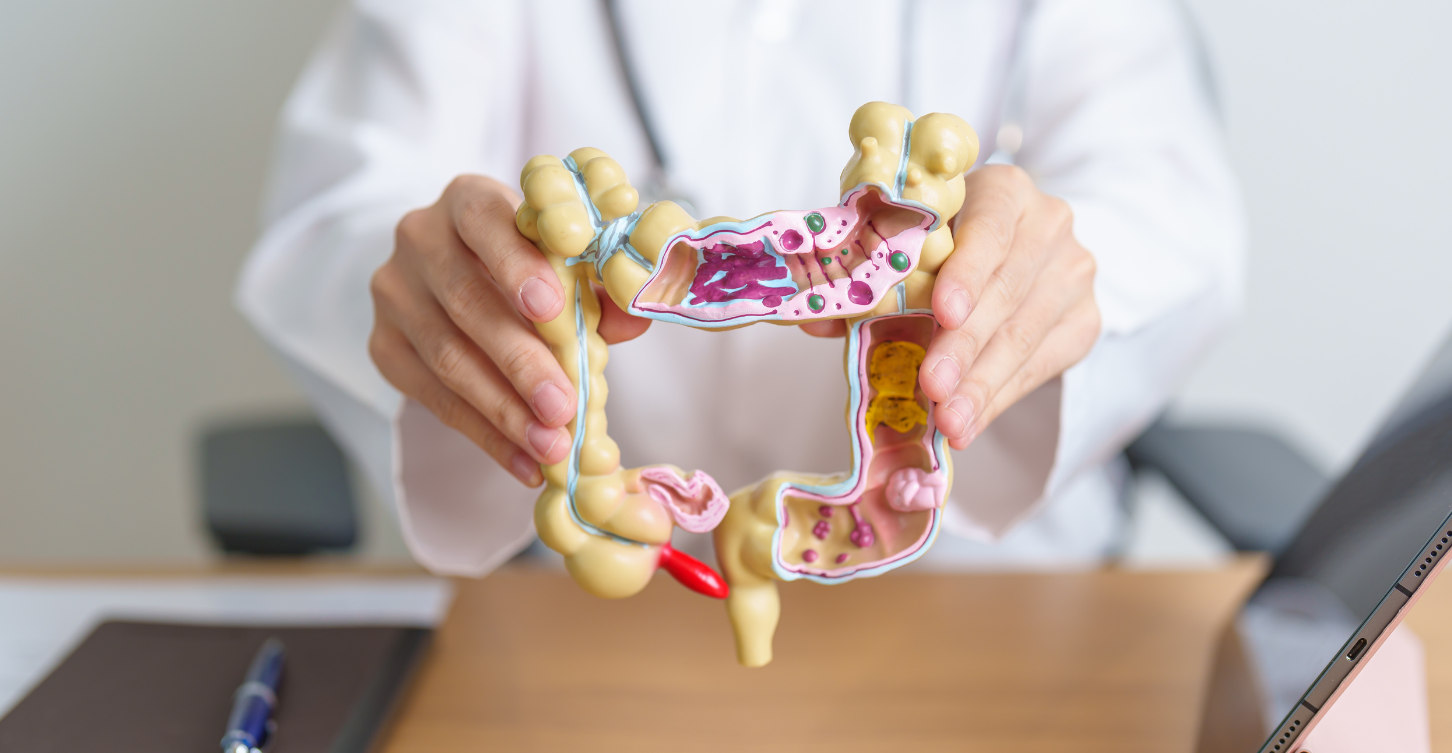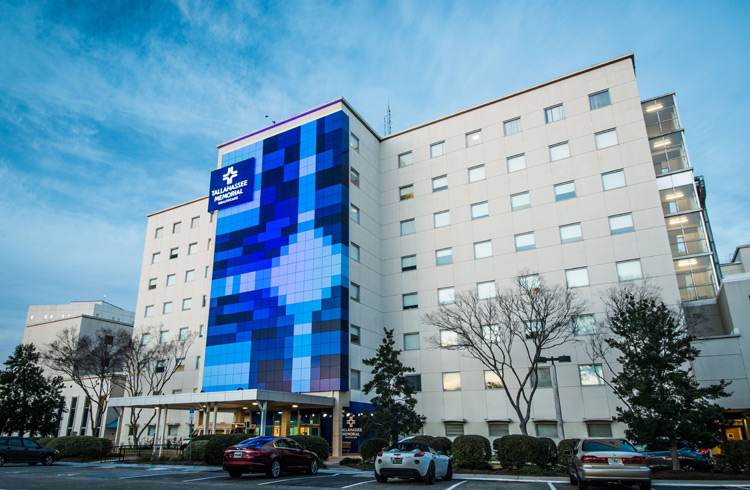It’s a Lot to Digest: The Scoop on Colorectal Diseases
August 25, 2025
By: Tallahassee Memorial HealthCare
Categories: Colorectal Disease, General Surgery, Healthy Living
When dissecting digestion, your mind may wander to some gross places, but your body depends on a healthy gastrointestinal tract to thrive.
What does the colon do?
The colon, also known as the large intestine, absorbs water and electrolytes, transports food waste and forms stool. The colon houses a vast community of bacteria that contribute to vitamin production and overall gut health. It maintains proper bodily functions and prevents digestive issues.
At the end of the colon is the rectum, comprising of six inches of the large intestine. This is where excess water, electrolytes and stool collect before nerves trigger the urge to defecate through the anus. The anus is comprised of muscles, nerves and mucous membranes that control bowel movements.
Understanding how the colon, rectum and anus function together is essential for appreciating how they influence overall health. When these organs work properly, they quietly sustain balance in digestion, hydration and waste elimination. But when problems arise, the effects can be disruptive, uncomfortable, and even life-threatening.
What is colorectal disease?
Colorectal diseases encompass a wide array of conditions affecting the colon and rectum. These diseases can lead to decreased quality of life and even life-threatening issues. Some of the most common colorectal diseases include:
1. Colorectal cancer
Colorectal cancer is the third most common cancer diagnosed in both men and women in the United States (excluding skin cancers). The lifetime risk of developing colorectal cancer is 1 in 23 for men and 1 in 25 for women. Screening via colonoscopy is the easiest way to find colorectal cancer in its earliest stages. Most people are recommended to start screening at age 45, but some people may need to start earlier if they are at a higher risk. Talk with your doctor about the right time to start.
2. Diverticular disease
Diverticular disease is a condition that occurs when small bulges or pockets (diverticula) develop in the lining of the intestine and become inflamed or infected (diverticulitis). Developing diverticula is associated with ageing, as the large intestine becomes weaker with age and the pressure of hard stools causes the bulges to form.
3. Rectal prolapse
With this condition, the rectum will slip down and protrude out of the anus. Without treatment, symptoms such as constipation and bowel control problems may worsen, and the rectum may drop through the anus more. This condition is more common in women and adults older than 50.
4. Inflammatory bowel disease (IBD)
Inflammatory bowel disease (IBD) is an umbrella term for several conditions that cause swelling and tissue inflammation in the digestive tract of an affected individual. The most common types of IBD include Ulcerative colitis and Crohn’s disease.
5. Irritable Bowel Syndrome
Irritable bowel syndrome (IBS) is a less-severe group of symptoms than IBD that cannot be seen during diagnostic imaging. Unlike IBD, IBS does not cause inflammation or increase the risk of colon cancer. Symptoms include abdominal pain, bloating, excess gas, cramps relieved by bowel movements and changes in bowel habits.
6. Anal disorders
Anal disorders are conditions that affect the anus, including hemorrhoids, abscesses, fissures, anorectal fistulas, cancer and more.
7. Crohn’s disease
Crohn’s disease occurs when layers of the intestinal wall are inflamed, leading to pain, diarrhea, and other complications. While genetics and immune system factors play a major role, smoking is the most significant controllable contributor to the disease. Crohn’s disease is a type of IBD.
8. Ulcerative Colitis
Ulcerative colitis causes continuous inflammation and ulcers in the lining of the colon and rectum. These ulcers, or open sores, develop where inflammation damages the intestinal lining. Ulcerative Colitis is a type of IBD.
What are the causes of colorectal diseases?
Experts are still studying all the causes of colorectal diseases, but several factors are known to increase risk:
- Diet: A diet high in fat, calories, or red and processed meats, and low in fiber, can increase the likelihood of developing colorectal diseases.
- Immune system: Abnormal immune responses may cause the body to mistakenly attack healthy cells in the digestive tract.
- Physical inactivity: Low physical activity levels are linked to slower digestion and a higher risk of colorectal conditions.
- Genetics: Inherited traits and family history can predispose individuals to colorectal diseases.
- Alcohol and smoking: Excessive alcohol use and tobacco or nicotine consumption increase the risk of colorectal diseases and cancer.
Simple lifestyle changes can treat some digestive tract illnesses, but others may require medication or surgical care.
Signs of Colorectal Diseases
Changes in bowel habits are common when the digestive tract is inhibited from properly breaking down food and disposing of waste. When the intestinal lining is inflamed or infected, symptoms like diarrhea, chronic constipation, or variations in stool consistency can occur.
Bowel movement complications are often paired with abdominal pain, such as cramps, bloating, gas or unexplained feelings of fullness.
Colonic polyps and diverticulitis are both ailments that form tissue growths and small pouches on the lining of the large intestine. Both types of lumps can be harmless but have a chance of becoming inflamed. This can cause pain, or in severe cases, colorectal cancer.
Additional symptoms include:
- Rectal bleeding, most likely caused by anal fissures
- Anal pain
- Lumps near the anus
- Mucus, pus or blood in the stool
- Feelings of tiredness
- Weight loss
Your Treatment Options
If you experience any of the above symptoms and are worried you may have colorectal disease, Tallahassee Memorial HealthCare (TMH) can help. TMH specializes in minimally invasive gastrointestinal procedures and offers advanced endoscopic procedures to treat colorectal diseases.
Speak to your primary care or gastroenterologist to assess the severity of a possible gastrointestinal ailment. This includes colorectal screening procedures such as colonoscopy, endoscopic ultrasound, sigmoidoscopy, endoscopic retrograde cholangiopancreatography, pH acid monitoring system and SpyGlass Direct Visualization Cholangioscopy.
Treatments can range from simple lifestyle changes and medications to colorectal surgery.
If colorectal surgery is needed, these procedures are done minimally invasively, often assisted by the Da Vinci Surgical System. Robot-assisted surgery offers a variety of benefits to patient, including:
- Less postoperative pain and discomfort
- Faster recovery
- Minimal visible scarring
TMH is home to Jarrod Robertson, MD, the region’s only board-certified and fellowship-trained colorectal surgeon. Dr. Robertson is board-certified in both general surgery and colorectal surgery and completed an additional year of specialized (fellowship) training in colon and rectal surgery.
To schedule an appointment with Dr. Robertson at TMH Physician Partners – General Surgery, call 850-431-2100 or ask your physician for a referral.

